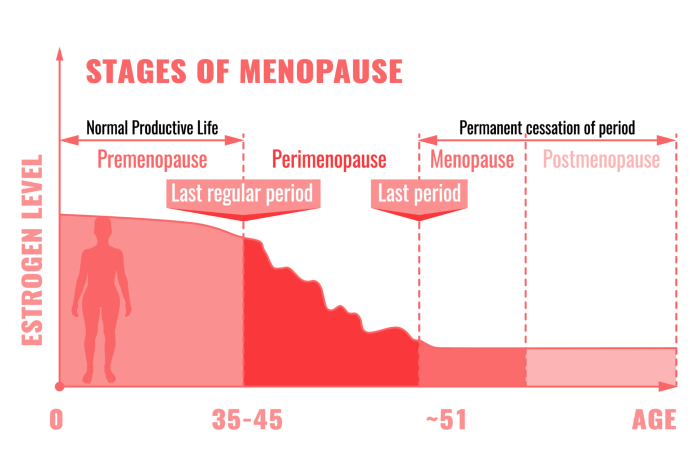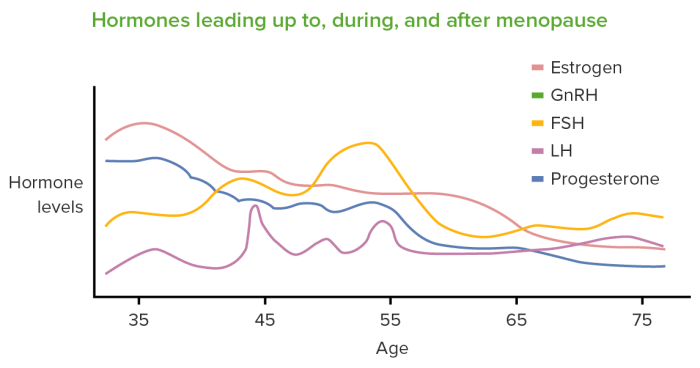Hormones for menopause, a topic often shrouded in misconceptions and discomfort, unravels the intricate hormonal tapestry of this significant life transition. As women navigate the ebbs and flows of menopause, understanding the hormonal shifts that accompany this journey empowers them to embrace this phase with knowledge and confidence.
Estrogen and progesterone, the hormonal maestros of the menstrual cycle, undergo a gradual decline during menopause, orchestrating a cascade of physical and emotional changes. This hormonal metamorphosis can manifest in a myriad of symptoms, including hot flashes, night sweats, mood swings, and sleep disturbances.
Hormone Replacement Therapy (HRT)
Hormone replacement therapy (HRT) is a treatment option for women experiencing menopausal symptoms. It involves taking hormones, such as estrogen and progestin, to replace the hormones that the body stops producing during menopause.
HRT can effectively alleviate a range of menopausal symptoms, including hot flashes, night sweats, vaginal dryness, and mood swings. It can also help prevent bone loss and reduce the risk of osteoporosis.
Types of HRT
There are different types of HRT, depending on the hormones used and the route of administration. The main types include:
- Estrogen-only therapy:This involves taking estrogen alone, typically in the form of pills, patches, or a vaginal ring. It is prescribed for women who have had a hysterectomy (removal of the uterus) and are not at risk of endometrial cancer.
- Progestin-only therapy:This involves taking progestin alone, typically in the form of pills or an intrauterine device (IUD). It is prescribed for women who still have their uterus to prevent endometrial hyperplasia and cancer.
- Combined therapy:This involves taking both estrogen and progestin, typically in the form of pills, patches, or a vaginal ring. It is the most common type of HRT and is prescribed for women who have not had a hysterectomy.
Risks and Benefits of HRT
HRT is generally safe and effective when used appropriately. However, there are potential risks and benefits to consider before starting HRT.
Benefits:
- Alleviates menopausal symptoms
- Prevents bone loss and osteoporosis
- Reduces the risk of heart disease in some women
Risks:
- Increased risk of blood clots
- Increased risk of breast cancer in some women
- Increased risk of endometrial cancer in women who still have their uterus and are not taking progestin
The risks and benefits of HRT vary depending on individual factors, such as age, overall health, and family history. It is important to discuss the potential risks and benefits with a healthcare provider before starting HRT.
Natural Remedies for Hormonal Imbalances

During menopause, hormonal imbalances can lead to a range of uncomfortable symptoms. While Hormone Replacement Therapy (HRT) is an option, many women seek natural remedies to alleviate these symptoms.
Natural remedies for hormonal imbalances include herbs, supplements, and lifestyle changes. It’s important to consult with a healthcare professional before taking any natural remedies, as some may interact with medications or have side effects.
Herbs, Hormones for menopause
Certain herbs have been traditionally used to balance hormones and relieve menopausal symptoms. These include:
- Black cohosh: May help reduce hot flashes and night sweats.
- Red clover: Contains isoflavones, which may mimic the effects of estrogen.
- Chasteberry: May help regulate menstrual cycles and reduce PMS symptoms.
Supplements
Some supplements may also help balance hormones and alleviate menopausal symptoms:
- Vitamin D: May help improve mood and reduce hot flashes.
- Calcium: Essential for bone health and may help reduce hot flashes.
- Magnesium: May help improve sleep and reduce stress.
Lifestyle Changes
Lifestyle changes can also impact hormonal balance:
- Exercise: Regular exercise may help reduce stress and improve mood.
- Diet: A healthy diet, rich in fruits, vegetables, and whole grains, may help support hormonal balance.
- Stress management: Techniques like yoga, meditation, or deep breathing may help reduce stress and improve hormonal balance.
Alternative Therapies
Alternative therapies are becoming increasingly popular for managing menopausal symptoms. These therapies include acupuncture, yoga, and meditation. While they may not be as effective as HRT, they can provide some relief from hot flashes, night sweats, and other symptoms.
Acupuncture is a traditional Chinese medicine technique that involves inserting thin needles into the skin at specific points on the body. It is thought to work by stimulating the release of endorphins, which have pain-relieving and mood-boosting effects. Acupuncture has been shown to be effective in reducing hot flashes and night sweats in some women.
Yoga is a mind-body practice that combines physical postures, breathing exercises, and meditation. It has been shown to improve sleep quality, reduce stress, and alleviate hot flashes. Yoga can also help to improve flexibility and balance, which can be beneficial for women who are experiencing joint pain or other physical symptoms of menopause.
Meditation is a practice that involves focusing the mind on a single thought or object. It has been shown to reduce stress, improve mood, and promote relaxation. Meditation can be helpful for women who are experiencing anxiety or depression during menopause.
It is important to find a qualified practitioner for any alternative therapy. Ask your doctor for recommendations or check with a local acupuncture clinic, yoga studio, or meditation center.
Dietary Considerations
Managing menopausal symptoms can involve dietary modifications. Maintaining a healthy weight, consuming nutrient-rich foods, and limiting processed foods are crucial. Incorporating foods that support hormonal balance can further alleviate discomfort.
Maintaining a Healthy Weight
Excess weight can worsen menopausal symptoms. Aim for a healthy body mass index (BMI) between 18.5 and 24.9. Regular exercise and a balanced diet can help maintain a healthy weight.
Consuming Nutrient-Rich Foods
Fruits, vegetables, whole grains, and lean proteins provide essential nutrients. These foods are rich in vitamins, minerals, antioxidants, and fiber, which support overall health and well-being.
Limiting Processed Foods
Processed foods often contain high levels of unhealthy fats, sugar, and sodium, which can exacerbate menopausal symptoms. Limit consumption of these foods to improve hormonal balance.
Incorporating Foods that Support Hormonal Balance
- Soy: Contains isoflavones, plant compounds that mimic estrogen and may help reduce hot flashes.
- Flaxseed: Rich in lignans, which have estrogen-like effects and may alleviate symptoms.
- Cruciferous vegetables: Broccoli, cauliflower, and kale contain indoles, compounds that help metabolize estrogen and reduce its negative effects.
- Omega-3 fatty acids: Found in fatty fish, walnuts, and flaxseed, omega-3s have anti-inflammatory properties that may reduce hot flashes and mood swings.
Lifestyle Modifications

Menopause brings about a myriad of physical and emotional changes, many of which can be attributed to hormonal imbalances. While Hormone Replacement Therapy (HRT) and natural remedies offer effective solutions, lifestyle modifications play an equally crucial role in managing menopausal symptoms.Regular exercise, stress management techniques, and adequate sleep can significantly impact hormonal balance.
Exercise, for instance, helps regulate the production of endorphins, which have mood-boosting effects and can alleviate symptoms like irritability and mood swings. Additionally, stress management techniques, such as yoga, meditation, or deep breathing exercises, help reduce cortisol levels, a hormone associated with stress that can worsen menopausal symptoms.
Adequate Sleep
Adequate sleep is essential for overall well-being, but it becomes even more important during menopause. Aim for 7-9 hours of quality sleep each night to allow the body to repair itself and restore hormonal balance. Establish a regular sleep-wake cycle, even on weekends, and create a relaxing bedtime routine to promote restful sleep.
Exercise
Regular exercise is crucial for managing menopausal symptoms. Engage in at least 30 minutes of moderate-intensity exercise most days of the week. Choose activities you enjoy, such as walking, swimming, cycling, or dancing. Exercise helps regulate endorphin production, improving mood and reducing symptoms like hot flashes and night sweats.
Stress Management
Stress can exacerbate menopausal symptoms, so it’s essential to incorporate stress management techniques into your daily routine. Practice relaxation techniques like yoga, meditation, or deep breathing exercises. Engage in activities that bring you joy and reduce stress, such as spending time in nature, reading, or connecting with loved ones.
Last Point: Hormones For Menopause

Managing the hormonal symphony of menopause requires a multifaceted approach. Hormone replacement therapy (HRT) offers a lifeline for some women, alleviating symptoms and restoring hormonal balance. Natural remedies, such as herbal supplements and lifestyle modifications, provide alternative paths to hormonal harmony.
Acupuncture, yoga, and meditation emerge as promising avenues for symptom management, harnessing the power of mind-body connection.
Embracing a nutrient-rich diet and incorporating regular exercise into daily routines further empowers women to mitigate menopausal symptoms. By nurturing both physical and emotional well-being, women can navigate this transformative chapter with resilience and grace.
FAQ Summary
What are the most common symptoms of menopause?
Hot flashes, night sweats, mood swings, sleep disturbances, and vaginal dryness are among the most prevalent symptoms.
Is hormone replacement therapy (HRT) safe for everyone?
HRT may not be suitable for all women, especially those with a history of certain medical conditions such as breast cancer or blood clots. It’s crucial to consult a healthcare professional to assess individual risks and benefits.
Can lifestyle changes help manage menopausal symptoms?
Absolutely. Maintaining a healthy weight, engaging in regular exercise, managing stress, and getting adequate sleep can significantly alleviate symptoms.